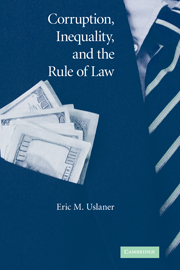Book contents
- Frontmatter
- Contents
- Preface
- 1 Corruption: The Basic Story
- 2 Corruption and the Inequality Trap
- 3 Corruption, Inequality, and Trust: The Linkages Across Nations
- 4 Transition and the Road to the Inequality Trap
- 5 The Rocky Road to Transition: The Case of Romania
- 6 Half Empty or Almost Full?: Mass and Elite Perceptions of Corruption in Estonia, Slovakia, and Romania
- 7 The Easy and Hard Cases: Africa and Singapore and Hong Kong
- 8 Corruption Isn't Inevitable, But …
- 9 Conclusions
- Appendix
- References
- Index
4 - Transition and the Road to the Inequality Trap
Published online by Cambridge University Press: 27 July 2009
- Frontmatter
- Contents
- Preface
- 1 Corruption: The Basic Story
- 2 Corruption and the Inequality Trap
- 3 Corruption, Inequality, and Trust: The Linkages Across Nations
- 4 Transition and the Road to the Inequality Trap
- 5 The Rocky Road to Transition: The Case of Romania
- 6 Half Empty or Almost Full?: Mass and Elite Perceptions of Corruption in Estonia, Slovakia, and Romania
- 7 The Easy and Hard Cases: Africa and Singapore and Hong Kong
- 8 Corruption Isn't Inevitable, But …
- 9 Conclusions
- Appendix
- References
- Index
Summary
What keeps a man alive?
What keeps a man alive? He lives on others.
He likes to taste them first then eat them whole if he can.
Forgets that they're supposed to be his brothers,
That he himself was ever called a man.
Remember if you wish to stay alive
For once do something bad and you'll survive.
From “How to Survive,” Berthold Brecht and Kurt Weill, The Threepenny OperaWhen Bo Rothstein (2000, 479) was invited to Moscow to lecture about the Swedish civil service, a Russian bureaucrat asked him: “‘How do you go from a situation such as Russia's to the situation which exists in Sweden?’ That is, how do you move a society (or an organization) from a low trust situation with massive tax fraud and corruption to a high trust situation where these problems, while still in existence, are much less severe?”
Is there a way out of this misrule, this lawlessness, and low trust? The inequality trap suggests not. Yet Russia and other countries that made the transition from Communism to democracy – in Central and Eastern Europe and in the former Soviet Union – are the major exceptions to my argument linking high inequality through low generalized trust to much corruption. Yes, they have high levels of corruption – the former and the handful of still Communist countries on average are more corrupt than either the West (by far) or the developing nations.
- Type
- Chapter
- Information
- Corruption, Inequality, and the Rule of LawThe Bulging Pocket Makes the Easy Life, pp. 94 - 120Publisher: Cambridge University PressPrint publication year: 2008



